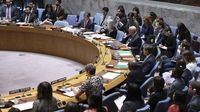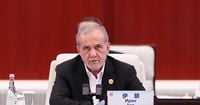Diplomacy at the United Nations over Iran’s nuclear program reached a dramatic turning point this week, as the Security Council failed to halt the automatic reimposition of sweeping sanctions on the Islamic Republic. The failed vote, which took place on September 19, 2025, in New York, followed weeks of high-stakes negotiations and left the world’s diplomats scrambling to assess what comes next for Iran, the nuclear deal, and the broader Middle East.
The draft resolution—introduced by South Korea, acting as the council’s rotating president—sought to extend the suspension of six UN Security Council sanctions that had been terminated after the 2015 nuclear deal. But with only four countries (China, Russia, Pakistan, and Algeria) voting in favor, nine against, and two abstentions, the measure fell short of the nine votes needed to pass, as reported by WANA and Axios. The result: unless a last-minute agreement is reached by September 28, the six previous resolutions (1696, 1737, 1747, 1803, 1835, and 1929) will automatically snap back into effect—restoring arms embargoes, ballistic missile restrictions, asset freezes, travel bans, and bans on nuclear-related technology.
This outcome is the direct result of a move on August 27, when Germany, France, and the UK—three European signatories to the nuclear deal—invoked the so-called "snapback" mechanism, citing Iran’s alleged failure to comply with its commitments. Under this mechanism, sanctions are automatically reinstated after 30 days unless an alternative agreement is reached. The vote’s timing was driven by pressure from the US, UK, and France, who wanted the matter resolved before the annual UN General Assembly high-level week, according to European diplomats and US officials cited by Axios.
Iranian officials responded with swift and forceful condemnation. Iran’s Permanent Representative to the UN, Amir Saeed Iravani, called the Security Council vote "hasty, unnecessary, and illegal," stating, “Iran does not recognize any obligation to comply.” He placed the blame squarely on the United States and the three European countries, insisting that “the responsibility for these grave consequences lies squarely with the United States and the three European countries.” The Iranian Foreign Ministry echoed this sentiment, declaring that Iran "reserves the right to respond appropriately to any unlawful action."
Foreign Minister Abbas Araghchi, in remarks to the press, underlined that Iran’s main grievance is with US unilateral sanctions, which he argued go far beyond the Security Council measures. “Iran’s main problem is with U.S. unilateral sanctions, which go far beyond the Security Council measures,” Araghchi told The Guardian. He also warned that if the snapback mechanism is implemented, Iran’s recent agreement with the International Atomic Energy Agency (IAEA) “will lose its validity,” and cooperation with the agency would not continue as before.
The diplomatic fallout has been immediate and severe. The snapback process is designed to be veto-proof unless the UN’s most powerful body acts to stop it, which did not happen. The sanctions will formally come into effect on September 27 at 8pm, as confirmed by Axios. This will subject Iran to even stiffer economic pressure, and, crucially, international inspectors may lose the ability to monitor its nuclear material and facilities. Some Western officials fear that Iran could respond by curtailing its cooperation with the IAEA or even withdrawing from the Nuclear Non-Proliferation Treaty (NPT)—a step with grave implications for regional and global security.
Those concerns were stoked further on September 20 when Iranian lawmaker Mohammad-Mannan Raeisi publicly called for Iran to exit the NPT and develop a nuclear weapon. "If we are to be sanctioned again by the United Nations over the false accusation of seeking nuclear weapons, why should we be deprived of possessing them in this lawless jungle where brute force is the only rule?!" Raeisi declared, as reported by WANA. He described Iran’s continued presence in the NPT while being sanctioned as “the worst of both worlds.”
Despite the heated rhetoric, some officials on all sides have insisted that the door to diplomacy remains open. Ambassador Dorothy Shea, the acting US representative to the UN, stated, “Our vote on this resolution does not impede the possibility of real diplomacy, despite any statements to the contrary.” She added that the US is ready "for meaningful, direct, and time-bound dialogue with Iran—be it prior to the conclusion of the snapback process on September 27, or after." The UK’s ambassador to the UN, Barbara Woodward, echoed this sentiment, saying, “The United Kingdom remains committed to a diplomatic solution. We are ready for further engagements diplomatically in the next week and beyond to seek to resolve differences.”
Iranian officials, too, have signaled that talks are not off the table. Ambassador Iravani said after the vote that “the vote does not close the door for diplomacy,” and confirmed that Foreign Minister Araghchi is set to meet his French, German, and British counterparts in New York next week. Behind the scenes, Iran had recently sent the E3 (France, Germany, and the UK) a proposal to extend the snapback deadline by several months in exchange for steps on its nuclear program and the resumption of negotiations with the US. According to European diplomats, the proposal included removing a stockpile of 60% enriched uranium from bombed facilities, in return for security assurances and the lifting of all sanctions and the snapback mechanism. Only after those steps, Iran said, would it dilute the uranium and discuss a final nuclear agreement. However, European diplomats dismissed the proposal as not serious, arguing that it required Western powers to give up all their leverage upfront without Iran taking practical steps first.
The backdrop to these negotiations is fraught with tension. Iran is still reeling from a 12-day war with Israel in June, which saw both Israeli and US forces bomb Iranian nuclear sites. This has raised questions about the status of Iran’s stockpile of uranium enriched nearly to weapons-grade levels. Yet, in a rare moment of cooperation, Iran and the IAEA recently reached a deal—mediated by Egypt—to grant inspectors access to all Iranian nuclear sites and to report on the whereabouts of all nuclear material. IAEA Director Rafael Grossi described the agreement as providing “a clear understanding for the procedures of inspection notifications and their implementation,” though the future of this arrangement now hangs in the balance.
As the snapback deadline approaches, the international community faces a moment of profound uncertainty. The failed vote at the Security Council has not only reignited old tensions but also exposed the limits of multilateral diplomacy in the face of deep mistrust and competing interests. With sanctions set to return and the possibility of Iran withdrawing from the NPT looming, the stakes for regional and global security have rarely been higher.
For now, all eyes are on New York, where last-ditch diplomatic efforts may yet avert the worst-case scenario. But as the clock ticks down, the world is left to wonder: will this latest crisis mark the end of the nuclear deal era—or the beginning of an even more dangerous chapter?


